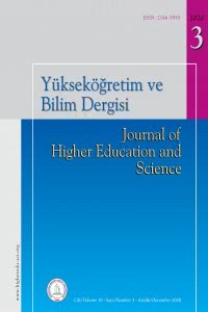İngilizce Öğretiminde Cyberhunt Kullanımının Okuduğunu Anlama Düzeyine Etkisi
Cyberhunt, İngilizce eğitimi, İngilizce öğrenme, İngilizce öğretimi
The Impact of Cyberhunt on Reading Comprehension Level in Foreign Language Teaching
Cyberhunt, English language learning, English language teaching, English language instruction,
___
- Abdallah-Pretceille, M. (1983). The perception of the other: Pivotal point of the intercultural approach. Francais dans le Monde, 181, 40-44.
- Lee, L. (2005). Using web-based instruction to promote active perspectives. CALICO Journal, 23(1), 139-152.
- Lih, A. (2009). The Wikipedia revolution: How a bunch of nobodies created the World’s greatest encyclopedia. Newyork: Hyperion.
- Liu, J. (2010). An experimental study on the effectiveness of multimedia in college English teaching. English Language Teaching, 3(1), 191-194.
- Mandl, H., & Freidrich, H. F. (2006). Handbuch lernstrategien. Göttingen: Horefe.
- Marzban, A. (2011). Improvement of reading comprehension through computer-assisted language learning in Iranian intermediate EFL students. Procedia Computer Science, 3, 3-10.
- Mede, E., & Uygun, S. (2014). Evaluation of a language preparatory program: A case study. International Association of Research in Foreign Language Education and Applied Linguistics ELT Research Journal, 3(4), 201-221.
- Memiş. M. R., & Erdem, M. D. (2013). Methods/usage features that are used ın foreign language teaching and critics. International Periodical For The Languages, Literature and History of Turkish or Turkic, 8(9), 297-318.
- Morris, B. (2005). Why study a foreign language? Retrieved from http://www.learnnc.org/lp.
- Nida, E. A. (2003). Language and culture: Two similar symbolic systems. In S. Petrilli (Ed.), Translation. Newyork: Rodopi.
- Orhan, A., & Çeviker-Ay, Ş. (2017). Evaluation scale of english language course curriculum conducted by distance education: A validity and reliability study. Journal of Higher Education and Science, 7(3), 534-545.
- Ökmen, B. (2015). The relationship between English language teaching methods, that English teachers use, and students’ academic success (Unpublished master’s thesis). Düzce Üniversitesi Sosyal Bilimler Enstitüsü, Düzce.
- Özil, Ş. (1991). Dil ve kültür. İstanbul: Cem Yayınevi.
- Özkanal, Ü., & Hakan, A. G. (2010). Effectiveness of university English preparatory programs: Eskisehir Osmangazi University Foreign Languages Department English Preparatory Program. Journal of Language Teaching and Research, 1(3), 295-305.
- Prensky, M. (2009). H. Sapiens digital: From digital immigrants and digital natives to digital wisdom. Innovate: Journal of Online Education, 5(3), 1-11.
- Rahimi, M., & Miri, S. S. (2014). The impact of mobile dictionary use on language learning. Procedia-Social and Behavioral Sciences, 98, 1469-1474.
- Rechtfertig, M. A. (2002). Online learning module: Internet cyberhunts. Working Paper. Dixie School District Staff Development Day.
- Renau-Renau, M. R., & Pérez-Garralón, B. (2016). Integrating ICT in a didactic unit: Lights, camera, action International Journal for 21st Century Education, 3, 7-26.
- Sancar-Tokmak, H., Sürmeli, H., & Ozgelen, S. (2014). Pre-service Science Teachers’ Perceptions of their TPACK Development after Creating Digital Stories. International Journal of Environmental and Science Education, 9(3), 247–264.
- Sancar-Tokmak, H., & Yanpar-Yelken, T. (2015). Effects of creating digital stories on foreign language education pre-service teachers’ TPACK self-confidence, Educational Studies, 41(4), 444-461.
- Ünal. D. Ç., Onursal-Ayırır, İ., & Arıoğul, S. (2011). The use of foreign language learning strategies by university students learning English, German and French. Hacettepe University Journal of Education, 41, 473-484.
- Vassilikopoulou, M., Retalis, S., Nezi, M., & Boloudakis, M. (2011). Pilot use of digital educational comics in language teaching. Educational Media International, 48(2), 115-126.
- Wilson, R. (1999). The importance of appearance in the design of web books (Unpublished master’s thesis). University of Strathclyde, Glasgow.
- Wilson, R., & Landoni, M. (2001, September). Evaluating electronic textbooks: A methodology. Proceedings of the Research and Advanced Technology for Digital Libraries, ECDL (pp. 1-12). Darmstadt.
- Yakut, A. D., & Aydın, S. (2017). An experimental study on the effects of the use of blogs on EFL reading comprehension. Innovation in Language Learning and Teaching, 11(1), 1-16.
- Yang, S., & Mei, B. (2018). Understanding learners’ use of augmented reality in language learning: Insights from a case study. Journal of Education for Teaching, 44(4),1-3.
- Yıldırım, N. (2012). Mobile learning in foreign language education with educational games (Unpublished master’s thesis). Fırat Üniversitesi, Elazığ.
- Zarei, R., Heidari-Darani, L., & Golestan, A. A. (2017). Effect of telegram application on Iranian advanced EFL learners’ vocabulary knowledge and attitude. International Journal of Foreign Language Teaching & Research, 5(20), 95-109.
- Zhu, Y., Wang, Y., Yu, C., Shi, S., Zhang, Y., He, S., Zhao, P., Ma, X., & Shi, Y. (2017, May). ViVo: Video-augmented dictionary for vocabulary learning. CHI ‘17 Proceedings of the 2017 CHI Conference on Human Factors in Computing Systems. Denver: ACM.
- ISSN: 2146-5959
- Yayın Aralığı: 3
- Başlangıç: 2011
- Yayıncı: Bülent Ecevit Üniversitesi (Önceden Zonguldak Karaelmas Üniversitesi)
Vakıf Yükseköğretim Kurumları’nın Akademik Üretkenliklerine Yönelik Analitik Bir Çalışma
Bireysel Yenilikçilik Özellikleri Çevrim İçi Öğrenmeye Hazır Bulunuşluğu Etkiliyor mu?
Yeliz SÜRME, Yağmur SEZER EFE, Özlem CEYHAN, Sevda KORKUT, Nuray CANER
Hatice KAHYAOĞLU SÜT, BURCU KÜÇÜKKAYA, Esra CUMUR, Ecem ÖZDEMİR
Üniversite Öğrencilerinde Narsisistik Eğilimler, Bağlanma Stilleri ve Sosyal Medya Kullanımı
Üniversiteli Kadın Öğrencilerin Gözünden Kadının Güçlenmesi
Eğitim ve Öğretim Teknolojileri Konusunda Yapılan Tezlerin İncelenmesi (2013-2018)
Şule Betül TOSUNTAŞ, Emrah EMİRTEKİN, İrfan SÜRAL
Üniversite Öğrencilerinin Yaşam Amaçları
Çiğdem AKIN ARIKAN, Selen DEMİRTAŞ ZORBAZ, Muharrem KOÇ
Rukiye günseli YILDIRIM, Güzin ÖZYILMAZ AKAMCA, Ahmet Murat ELLEZ, Sibel KARABEKMEZ, Ayşe Nur BULUT ÜNER
Hemşirelik Öğrencilerinin Eğitim Stresi ve Akademik Başarısı: Üç Farklı Eğitim Yönteminin Etkisi
Nuray EGELİOĞLU CETİŞLİ, Sezer ER GÜNERİ, Hatice MERT, Elif ÜNSAL AVDAL, Yasemin TOKEM, Hatice YILDIRIM SARI
